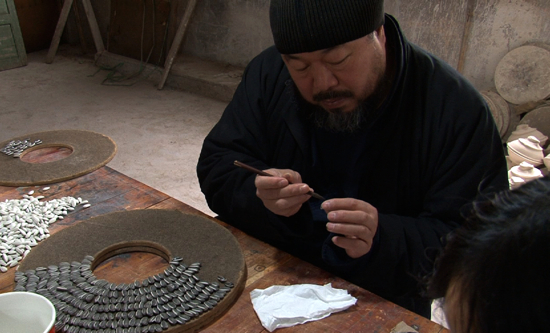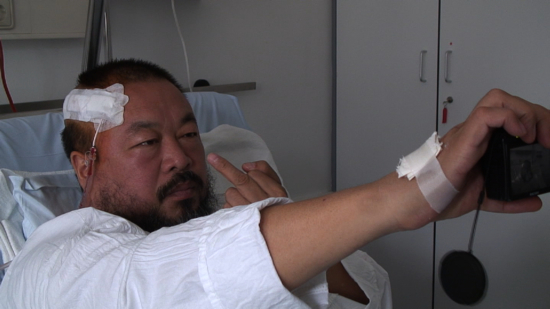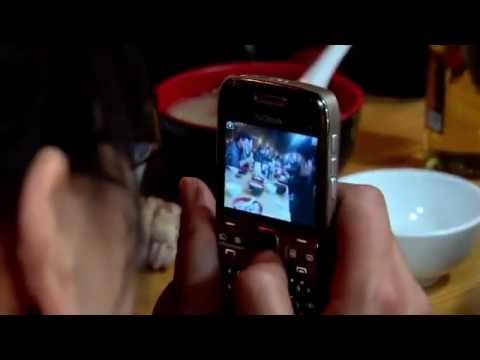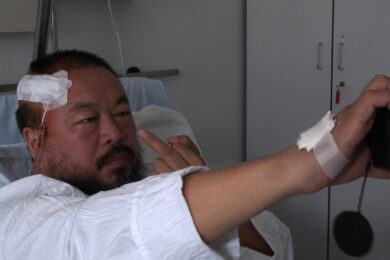The desire to rip things up and start again is a universally understood artistic motivation visible everywhere from poetry to punk, and US filmmaker Alison Klayman’s timely, well-tempered portrait of Chinese artist Ai Weiwei reveals the finer details of the machine he rages against. But despite his rising profile as an icon of dissent and an art world power broker, we see that Ai’s defiant spirit dwells in a composed and humble man, his work and activism fuelled as much by fear as by confidence.
One of the most poetic moments comes at the beginning, in an interview conducted at Ai’s home and headquarters at FAKE Design in Beijing. The voice-over is heard above quick shots of the forty plus cats living on the premises. One has learned to leap up to the door handle and release the latch, escaping to the outside world. Had he never seen a cat do that, Ai explains, he would never have known that cats were capable of such a feat.
What seems like oversimplicity in the artist quickly becomes a personable, conversational ease as we follow the preparation for his biggest and best-known UK piece, ‘Sunflower Seeds’, which appeared at the Tate Modern in 2010, filling the Turbine Hall with 100 million individually crafted and handpainted sunflower seeds. Original footage shows episodes from his well-storied involvement in designing Beijing’s ‘Bird’s Nest’ stadium then renouncing the city’s Olympic Games as a propaganda-fuelled "fake smile for the foreigners", and his campaign against official censure to collate the names of the 5212 children who died when low-cost state-built school buildings, referred to as ‘tofu architecture’, crumbled in the May 2008 Sichuan earthquake.
In narrative terms the film follows Ai’s effort to hold the Chengdu police to account after he was struck on the skull in a 3am raid while waiting to testify for fellow earthquake activist Tan Zuoren. An incredible scene captures the confrontation, exactly a year later, between Ai and the officer who hit him. Ai walks right up and plucks the sunglasses from the policeman’s nose, snapping a Twitter picture of his face to force transparency. Interviews with curators, champions and cultural figures including the publisher Hung Huang and Ai’s mother Gao Ying are mixed with archive photography and video to portray Ai’s time in New York in the 1980s, as well as the China of the early ’50s where Ai’s father was forced into 19 years of ‘re-education through labour’ for his own outspoken poetry.
We get a broad sense of the oppressive and corrupt Chinese Communist Party and how exceptional a dissenting voice Ai was before being taken into custody on unproven charges of tax evasion, unlawfully detained for 81 days with guards watching him in both the bedroom and bathroom. This occurred in 2011, with Klayman already months into the edit. While the doc has a natural ending in a long shot of the Tate exhibition (the artist to the right of the frame, his son sitting off to the left happily playing among the seeds), Klayman wisely decided to continue shooting, ensuring that her story at least tries to keep pace with events.
It makes sense to talk about Ai’s roles, given that he qualifies equally as architect, activist, artist and agitator. We see him as a loving father, and as a mystified son to a fretting mother who worries that he’ll "be bullied" by the authorities. In a funny but sinister clip from Ai’s own earthquake documentary Lao Ma Ti Hua (aka Disturbing The Peace) we share another encounter with the Chengdu police, who want to force Ai and his companions from their meal at a roadside restaurant of the same name. The officers goonishly record footage of the meal while Ai’s own videographer Zhao Zhao trains his lens over the police cameraman’s shoulder. The scene is unintentionally funny, Ai genially eating as the watchers become the watched. He tweets: "There are no outdoor sports as graceful as throwing stones at a dictatorship."
Seeing his responses to situations like this is to see that as a young man he was motivated by the urge to reconstitute official Chinese history by tearing things up, by reordering and rebuilding. In his earliest New York exhibitions the artist cuts up shoes and bends clothes hangers into facial profiles. After returning to China in 1993 to aid his ailing father, Ai famously smashes a Han Dynasty urn and updates Neolithic vases with dollops of bright paint, the reds and blues dripping down to cover the material of antiquity.

But after voicing outright criticism of the government, the menace of arrest escalates in tandem with his international profile. After surgery in Germany to repair his head wound, the art of the aggressive gesture actually takes on a more playful and strategic character. When FAKE Design is placed under surveillance, Ai installs webcams to show his actions 24 hours a day. When he is commissioned and permitted to build a million-dollar studio in Shanghai, the authorities turn about-face after three months and serve notice of demolition. Rather than protest the destruction, Ai announces a party for hundreds of supporters who hold a river crab feast on the site.
Klayman remains responsive to a story which is very much in flux, resisting the urge to adopt Ai’s causes as her own. Even as the campaigner becomes the cause, she sticks fast to the documentarian’s impulse, showing rather than shadowing, allowing us to understand his growth and to understand the context behind the headlines. Her film has, as they say in the USA, ‘opened big’ in New York, San Francisco and Los Angeles. It’s a crucial amplification of the artist’s themes and messages: the importance of open communication, transparency and free expression. Last month the Chinese government upheld a $2.4 million tax evasion fine, while barring Ai from his own appeal hearing. In the midst of an unfolding story Klayman captures her subject in what could be his most enduring role: one of a growing number of Chinese cats truly capable of opening doors.
Ai Weiwei: Never Sorry opens in cinemas nationwide this Friday August 10, with exclusive pre-release screenings throughout the week at Curzon Soho.




